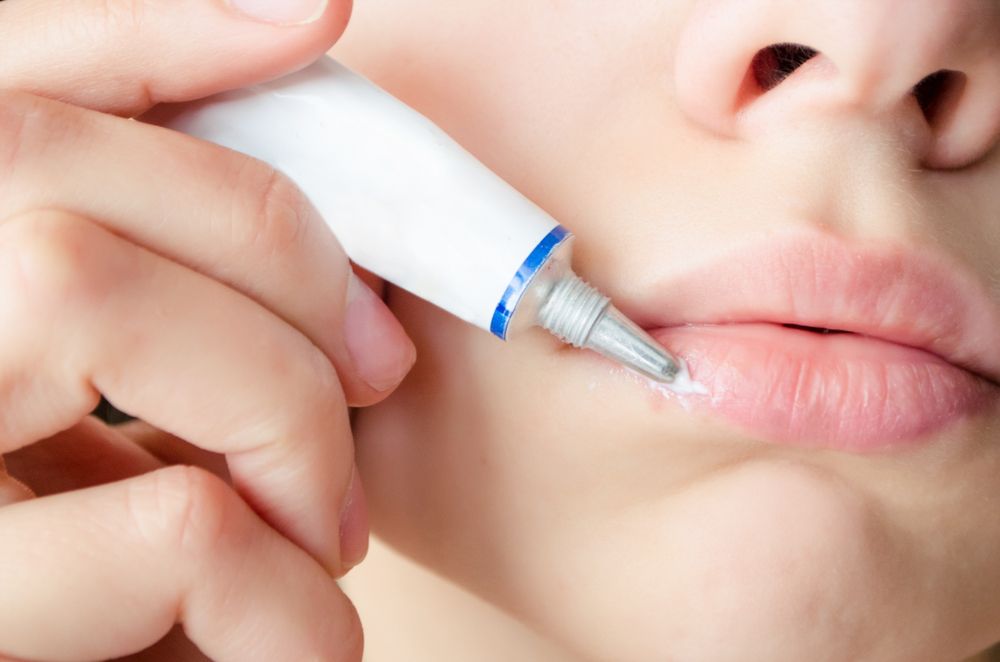Herpes is an infection caused by a virus. It can be a long-term condition. (Learn More) Symptoms include burning during urination, fever, and sores on the mouth and genitals. (Learn More)
Herpes is spread when someone who has the HSV virus has unprotected sexual or mucosal contact with another person. (Learn More)
It is easily treated with antiviral medication, such as acyclovir (Zovirax) and valacyclovir (Valtrex).( Learn More) Home remedies can reduce associated discomfort. ( Learn More)
Developments in telemedicine mean that a patient can get a diagnosis and prescription from the privacy of their own bedroom. ( Learn More) This can help to ensure faster diagnoses and prompt treatment for those in need.

What Is Herpes?
Herpes is a viral infection caused by the herpes simplex virus, or HSV. The virus strikes the external genitalia, the anal region, mucosal surfaces (parts of the body where there are saliva, tears, nasal, gastric, and cervical and bronchial mucus), and skin in other parts of the body.
While there are eight types of herpesvirus that can affect humans, most forms of herpes are caused by herpes simplex 1 (HSV-1) and herpes simplex 2 (HSV-2). HSV-1 is what we commonly refer to as oral herpes, and HSV-2 is known as genital herpes. Oral herpes is most commonly associated with cold sores or blisters around the mouth, whereas genital herpes involves sores on the penis, vagina, anus, and surrounding regions.
Many people who get infected never display any symptoms despite being positive for HSV. As a result, it is believed that a large amount of people who have herpes are unaware. For others, it can take months or even years after becoming infected to experience symptoms.
People who show their symptoms in the initial phase of infection will typically feel them four days after being exposed to the virus, but it can take as long as 12 days for the first signs to appear.
Besides sores and blisters, symptoms of herpes include painful urination, ulcers, and vaginal discharge. There is no cure for herpes, but it can be treated with a combination of home remedies and medications.
The Herpes Virus
Herpes is incredibly common. About half the American population under age 50 has HSV-1. Approximately 12.5 percent of Americans in this age group have HSV-2.
People who have HSV may have recurring outbreaks, where they experience recurring resurgences in their symptoms (notwithstanding treatment). These resurgences tend to happen more frequently following the first infection, but with time, the remission periods get longer, and subsequent HSV recurrences tend to be less severe.

Symptoms of Herpes
When talking about herpes, “primary infection” is used to describe the development of the infection that takes place when a patient is first infected with the virus. There are many symptoms, and they can be very severe.
- Painful urination
- Vaginal discharge
- Fever
- Blisters and ulcers on the external genitalia, inside the vagina, or on the cervix
- Enlarged and sensitive lymph nodes
- Cold sores near the mouth
- General feeling of being unwell (malaise)
- Skin blisters
If there are no complications and treatment is followed, the ulcers will heal without leaving any scars.
On the other hand, herpes symptoms that are part of a recurrent infection are usually less severe, and they do not last as long as they would in a primary infection. For recurrent infections, symptoms dissipate after 10 days. They can include the following:
- Cold sores near the mouth
- A burning sensation around the external genitals before blisters appear
- Blisters and ulcers on the cervix for women
Over time, recurrences happen with less regularity and severity.
How Is Herpes Spread?
When the HSV virus is present on the surface of an infected patient, it is easily transmitted to someone else via the moist skin around the mouth, the anus, or the genitals.
Despite many myths and urban legends, there is no truth to the rumor that humans can contract the herpes virus by coming into contact with a work surface, a sink, a towel, or any other object that has also been touched by a person infected with HSV. That is not how the virus works.

Infection can happen only in specific ways.
- Unprotected vaginal or anal sex
- Oral sex with a person who gets cold sores
- Sharing sex toys
- Genital contact with an infected person
The time the virus is most likely to be passed on is just before the blister appears, when the blister is visible, and before the blister is completely healed. When the blister is healed, the chance of giving HSV to someone else is very low, but it’s still possible.
For example, a mother who is positive for genital herpes and has sores as she gives birth will likely pass the infection on to her baby. As a result, the obstetrician will discuss strategies to avoid this prior to childbirth.
Medications to Treat Herpes
The most common prescription medications used to treat herpes are acyclovir (Zovirax) and valacyclovir (Valtrex).
Famciclovir (Famvir) is a newer antiviral medication that is also used to treat the virus. It is most commonly prescribed to those who don’t respond well to acyclovir.
All these medications works best when they are taken within 48 hours of the first signs of an outbreak. They do come with the potential for side effects, including nausea, diarrhea, lightheadedness, fatigue, joint pain, vision changes, and hair loss. Talk to your doctor if you experience these side effects.
There is no drug that can remove the herpes virus from a patient’s body. A prescription antiviral drug like acyclovir can stop the virus from multiplying. Such medications will help the outbreak of herpes clear up faster, and they can help to tone down the intensity of the symptoms.
Antivirals for herpes are normally prescribed the first time the patient presents with symptoms.
Since recurrent outbreaks tend to be milder, further prescriptions are not typically necessary.
Episodic treatment of herpes is meant for patients who have fewer than six recurrences of the virus in a single year. In this case, doctors can prescribe a five-day program of antivirals with every appearance of symptoms. Some people may need to be antiviral medications during times of high stress or lowered immunity.
There are also suppressive treatments for herpes. These can be prescribed for patients who experience more than six recurrences of the virus in a single year. In particularly bad cases that require suppressive treatment, a patient might be prescribed an indefinite program of antiviral medications, with the idea of suppressing future recurrences of the virus.

At-Home Care
There are a number of different treatment options for herpes. While none of these will cure the condition, they can effectively manage symptoms and lessen discomfort.
They can be simple home remedies, such as taking lightly salted baths that offer some comfort for the symptoms. Other such solutions can include:
- Taking over-the-counter painkillers like ibuprofen or acetaminophen.
- Applying petroleum jelly to the affected area.
- Wearing loose clothes that don’t come into contact with the affected skin.
- Washing hands regularly and thoroughly, especially after touching the affected skin.
- Not engaging in any sexual activity until all symptoms have cleared.
- Applying lidocaine to the urethra to help with painful urination.
- Wrapping an ice pack in a cloth or towel and applying that to the affected skin.
Using Telemedicine to Treat Herpes
Herpes can be an embarrassing condition for many patients to deal with, and talking with a doctor about symptoms or risk factors might be difficult. This is one area where telemedicine can help.
The American Council on Science and Health explains that telemedicine is the use of internet-enabled devices to connect patients with doctors, without either of them having to be in the same room. It is effectively using computers, laptops, and smartphones to bring health care across vast distances, and it removes a lot of barriers to treatment, such as distance and even overhead costs.
While telemedicine offers many practical benefits — it provides cheap and very accessible health care to everyone — it gives patients other, more specific comforts as well. For example, a specialized telemedicine company developed an app called HerpAlert, which is meant only for the diagnosis and treatment of the herpes virus. This is so there is a greatly reduced element of shame that a patient might otherwise experience when their symptoms first appear.
The app can connect a patient to a doctor within 12 hours of the first outbreak (around the clock, seven days a week, from the comfort of the patient’s own bedroom), and a doctor can remotely write a prescription for the patient, without the patient having to endure long wait times and invasive examinations. Time is of the essence when treating herpes. A quick evaluation, diagnosis, and prescription can greatly reduce the severity of HSV symptoms.

There is still a great deal of stigma surrounding herpes in 2022, and this can make many patients put off seeing a doctor to get a prescription for the virus. By delaying diagnosis and treatment, the symptoms of herpes can worsen.
An app like HerpAlert (or another similar app) gives patients immediate and confidential care without ever having to leave their own homes. All a patient has to do is use their phone to send a picture of the affected area to a doctor. The app encrypts the transmission in the private patient portal, and a specialist can offer a diagnosis and treatment plan.
Many insurance companies are embracing the cost-savings and convenience of telemedicine. Various providers offer their own app that allows these services to happen easily and quickly.
While telemedicine won’t completely replace in-person visits, it can enhance convenience for patients, resulting in more timely care. This is key when it comes to herpes.
In some instances, patients will still need to see a doctor in person for an accurate diagnosis. Oftentimes, a follow-up visit may be required if outbreaks don’t clear up in a few days.
A Manageable Condition
Notwithstanding the stigma and frustration of having herpes, it is a very treatable condition. New medications can suppress outbreaks, helping patients to experience fewer symptoms of the virus. These medications can also reduce the severity of outbreaks and clear them up more quickly.
Thanks to new developments in telemedicine, a patient might be able to receive a diagnosis and treatment more quickly than ever before.
References
Symptoms, Causes, and Treatment for Herpes. (November 2017). Medical News Today.
Here’s How Many Americans Now Have Herpes. (February 2018). Live Science.
Herpes. (October 2017). Family Doctor.
Herpes Signs and Symptoms. American Sexual Health Association.
Oral and Genital Herpes. Planned Parenthood.
Try This: 37 Home Remedies for Herpes Simplex Virus-1 and -2. (September 2018). Healthline.
Treatment Options for Genital Herpes. (September 2018). WebMD.
How Telemedicine Can Revolutionize the Healthcare Market. (January 2019). American Council on Science and Health.
What Are the Benefits and Advantages of Telemedicine? (August 2015). Healthline.
Addressing the Consequences of Herpes Stigma. (May 2019). Verywell Health.








